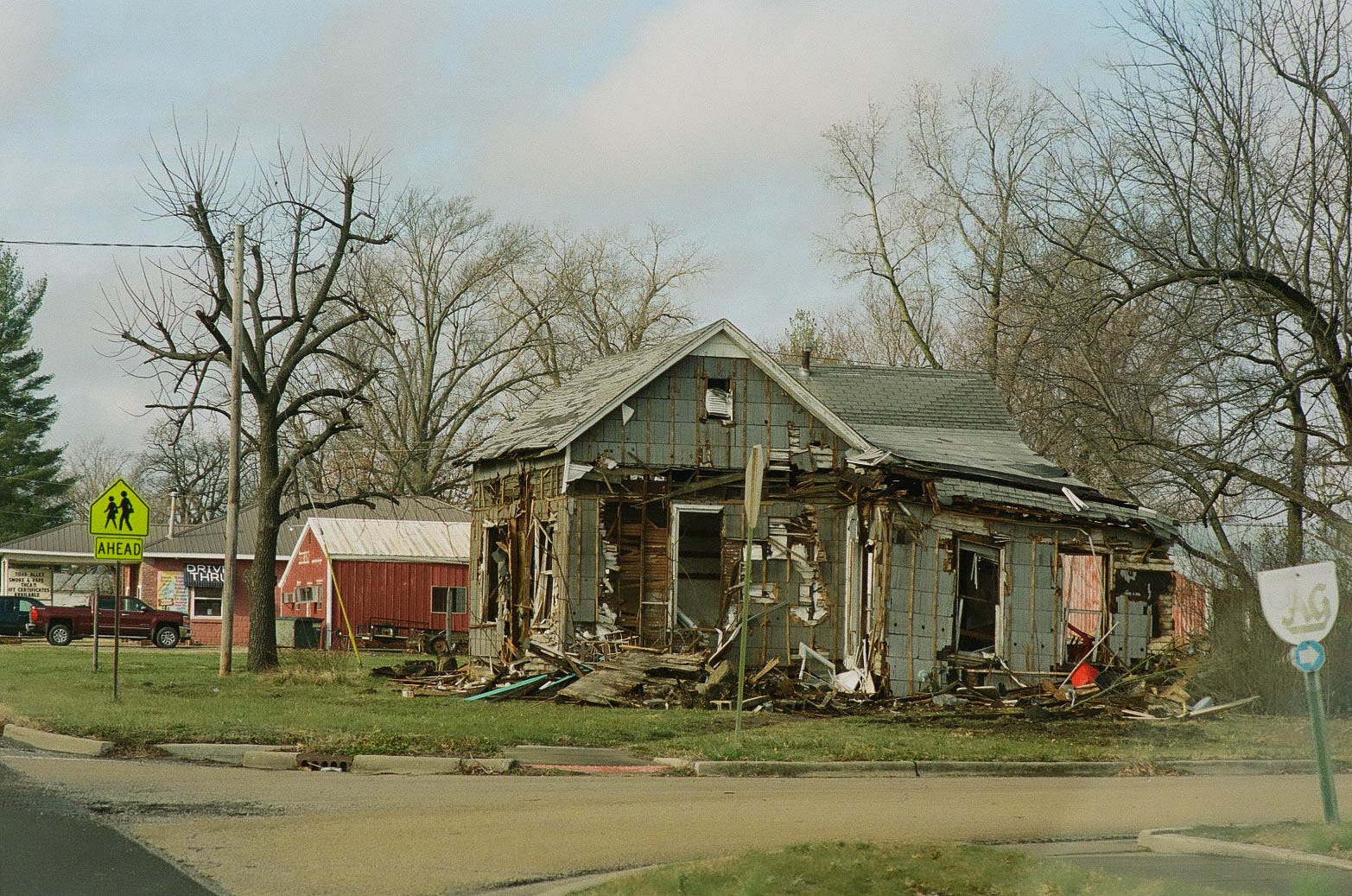Housing & Instruments of the State
More thoughts on Alva Gotby's "Feeling at Home" and thoughts it's making me struggle with.
Hello! This week's post is a sort of continuation from my Goodreads review of Alva Gotby's Feeling At Home. You can read my review here. This is a little shorter and a little less personal than usual. I'm working on a bigger piece that I'm having a hard time making sure I get right for next week. That piece will be titled, "To Be Good" or something similar.
Gotby's book is an ask-questions book, and while a lot of it falls into the sort of philosophic writing that seems more imaginative than functional, I like the questions it asks and I like the conflict it causes me. I think books like this are important, especially when they make us think about our behavior and our values.
An Instrument of the State
In addition to the physical health effects of damp, mould, and cold, and the strain of having to try to make the best of a bad situation, there is the additional emotional damage of being implicitly or explicitly labelled as undeserving of a decent home. Renters I meet who live with disrepair and poor conditions sometimes mention feelings of shame, as if the conditions in which they live were an expression of their character. ... The tendency to blame issues such as mould on individual behaviour also serves to stigmatise individuals and obscures structural issues.
(page 69)
Gotby's book is written from a United Kingdom perspective, but the situation in the States is similar, if not worse. I used to perform Housing Quality Standards (HQS) inspections for the homelessness program I worked in years ago. The thing about working in a small county is that you work with the same landlords over and over again, because they're the only folks who will accept the vouchers. You know that, and they know that.
In many places, it is perfectly legal to discriminate against households holding vouchers. Landlords can refuse to even consider a household's application if the rent will be paid by the voucher. This has never made much sense to me, but it was the way things were in most parts of Illinois until 2023. I'll let you in on a little secret: it's still happening, probably everywhere it is officially banned. Do you think folks holding vouchers have easy access or the time capacity it takes to sue a landlord? What would it accomplish for them?
Anyway, I knew that I knew that and I knew they knew that when I would go in with my clipboard and note every deficiency. I found myself arguing about whether a thing was bad enough to actually fail an inspection -- arguing with myself. A closet door is broken and doesn't shut. Does that actually violate a standard on doors being functional? A window won't close all the way, but you're on the third floor. Is that a problem? That one is a lot easier, because it's going to cost the client money and maybe be a harm to a child.
One unit I looked at had only one working burner. Is that good enough, or not? By a lot of housing standards, that is just fine.
This same unit had an infestation problem. The resident had put all of their food into airtight containers and put them on the kitchen table. The landlord stood there and said the bugs were because all the food was out of the cabinets. Guess what was in the cabinets? Roaches. I opened the freezer - guess what was in the freezer? Roaches. Do you have any idea how bad a roach infestation has to be for roaches to be in the freezer?
The bummer of all this is that you have very little you can do in this position. The agency operating the voucher doesn't want to move them, because that costs money. They are often quite happy to say that the infestation is the client's fault.
This landlord actually had the gall to have some high school jerkoff come in and start spraying things while I was there. I asked him what was in the can, and he didn't know. I felt good about telling the landlord they'd have to get an actual company in here to do integrated pest control. I felt less good when the recipient chose not to actually require that.
Renters, especially those receiving vouchers, are terrified to lose their housing. There is not much affordable housing available, and they are often made to live in shitty conditions. I remember when I was a kid, after the divorce, my mom went to look at a trailer to rent. She said the place felt weird and felt like the walls were moving. When she turned the light on, the walls were covered with roaches. I don't doubt it.
Here, it is useful to return to Friedrich Engels' phrase 'social murder': 'murder against which no one can defend himself, which does not seem what it is, because no man sees the murderer, because the death of the victim seems a natural one, since the offence is more one of omission than commission.'(^16)
(page 70)
This page hit me pretty hard. Inspecting HQS was years ago. I'm in a different position now helping figure out how to apply policy to the programs I used to work in. There is a new inspection standard called NSPIRE -- what's the right way to apply it to homelessness programming, when it clearly wasn't designed with it in mind? Do you apply all of the standards that are possible, if you know that applying them will reduce housing options?
If a person in a supportive housing program dies because of a lung condition exasperated by mold and mildew, who is responsible for that death? Is it the landlord that let the housing exist dangerously, is it the housing provider that applied the minimum standards as they were written, or is it the person that determined what standards should be applied?
It's a bit of everyone, isn't it? Maybe the most craven of them is the landlord that operates substandard housing. But if a federal entity tolerates substandard housing, they are affecting far more people and facilitating far more harm than the average landlord.
Local councils, which on paper have the power and responsibility to ensure housing standards don't fall below a basic minimum, lack the financial resources to either improve their own housing stock or enforce standards in the private rented sector. Disabled and elderly people are regularly abandoned in homes that are completely unfit for their needs.
(page 70)
Landlords know that only the most egregious of deficiencies are likely to lead to a failed housing inspection. During COVID, some programs began packaging new tools to get landlords to rent to homeless households. So known is it that landlords discriminate on voucher status that the Federal government now offered to pay landlords for the honor of paying them. One program, the Emergency Housing Voucher program--the first federal program requiring Public Housing Authorities and homeless Continuums of Care to work together--included a service fee. This was $3500. There were a variety of eligible uses for the service fee, including security deposits, household essentials (furniture is notoriously difficult to purchase for homeless households with federal funding).
When EHV rolled out, I was leading a Continuum of Care. The PHA I worked with (they hated my guts, by the way) wanted to give the entire $3500 to the landlord as a landlord incentive. That was equivalent to 2-4 months of rent depending on the apartment. Absolute insanity. I think, in the end, we got them down to $1000 or $1500. Even that boggles my mind.
I think landlord incentives are indicative that our housing system is completely busted. When you have to pay a landlord for the honor of paying them, that is ridiculous. I'd rather repossess all of their surplus property and turn it into public housing. Of course, suggest that and you'll likely be set on fire. That this is "necessary" stems from decades of divestment from public housing and in fact an intentional move to destroy public housing stock and convert it into voucher-based systems. Public Housing has been restricted for decades, and programs moving to project- and tenant-based housing vouchers that serve the landlord system replaced it long ago. Extant public housing stock has been in the process of converting to "long-term" voucher-based stock for some time through the Rent Assistance Demonstration program. All of this is bad news for the people of the country that aren't landlords.
Abolishing Families
Chapter 8 of Gotby's book is titled "Collective Housing and the Abolition of the Family." I really bristled at this chapter, because I have an exceedingly difficult time imagining the transition from our current reality to the reality that would need to exist to make the contents of this chapter feasible.
Probably part of my hesitation is that I want a family someday. I don't know what it would look like, but I would like a partner, someone to be important to and to have be important to me and all of the feelings and experiences that go with that. I think there is a level of trust and love that is not really possible outside of that context. I've always been really scared of having a child, but there is a very small part of me that thinks I would be a good father. I hope that isn't a delusion. I would like to read my children to sleep someday and read in goofy voices in a way I was never read to.
So, maybe I'm predisposed to bristle at some of these. I'm also not super interested in the idea of sharing canteen facilities and laundries with hundreds of people, which is what this book suggests.
And as facilities for leisure and transport could be merged with the domestic sphere from the outside, Hayden also points out that the caring work that currently happens in the private sphere could stretch out from the domestic space into the world(^15). Kitchens, laundries, childcare facilities, and support for elderly and disabled people could be located at a community level. This dual movement would cause a blurring of boundaries between the private and public spheres.
(page 137.)
I wrote about this in my Goodreads review and am mostly going to copy/paste that here. I had a strong negative reaction reading this. Pools and theaters at the community level sounds all well and good (actually it does not sound far off from what you often see in gentrifying neighborhoods, but we can put that aside). But I wonder when the last time the authors used a laundromat was. I grew up using them and let me tell you, it sucks. Broken machines, never knowing if there will be a machine open or not, machines that are shit and demand two or more cycles to actually dry your clothes. Yes, many of those complaints are artifacts of the commercialization of a basic service like laundry, and the argument from the author et. al. would likely be that in a socialized world where these machines are well-maintained by the locality and do not demand $1.50 or more per load, the complaints are nullified. I'm not so sure.
What is annoying about my gut reaction is that it demonstrates just how deeply the commodification of basic life needs has gone. I struggle to imagine what a laundromat would look like if it were driven by public utility, not profit. So, I can understand that much of my objection comes from social conditioning. My question is, if we're all conditioned to some extent, what does the transition look like to a better world? And do we have to go to the fullest extent of what this looked like in UKLG's The Dispossessed? This is in fact what the author (and the authors she cites) begin describing:
Many things now done in the private home could be far better done in shared space: canteens can replace most kitchens and dining rooms; creches replacing a child's individual play room; entertainment rooms could serve as places to watch television or hang out in groups; personal studies could instead be shared libraries and co-working areas; home maintenance and cleaning equipment could be available in common space; vehicles could be similarly shared.(^17)
(page 140)
I wonder how this would be applied in rural communities. Speculative fiction is full of ideas like this, some of it really enjoyable. If you were to present some of these ideas to folks now, without a lot of conditioning, I think you'd hear something like, "that sounds like a homeless shelter."
On page 147, Gotby gives the understatement of the book: "When people are forced to share with strangers, this often leads to significant discomfort." She follows this up, "But when people have the option of cohabitating with people they enjoy spending time with, shared housing can be both more joyful and less labour-intensive than households of one or two adults."
I'm willing to amuse this. A friend of mine is really into the idea of communes. I admit I am totally allergic to this idea. I value my privacy and as much as I like running into someone on the street or spending time with people, I sort of want my home to be private. Anyway, this sounds certainly a lot better than a mandated sardine can, which is how much of this was presented in the book before this point. I can absolutely imagine living in a community with people I know and like.
I think the most important thing in all of this is that housing should not be a life defining decision. In the current system, housing is life or death--literally. It is hard to get and hard to hang onto and the idea of an owned home is the signature of the American Dream no matter how illusory that dream is. The family home is viewed as a major life goal, a thing bought once and hopefully passed on for generations. I don't think this is as it should be. Maybe that's because both of my childhood homes were destroyed and no longer exist. I don't know.
What I do believe is that if housing is seen less as a major function of identity and worth, changes like these become much more feasible. If there are large social housing projects alongside co-ops, alongside private apartments and the occasional single family home where such things make sense, I think the prospect is a lot more attractive.
I'm aware this is all a little formless. I might write more about this in the future. In the mean time, thank you for reading!
Other Reading/Writing/Watching
2/7/25 — Movie review, HERETIC (3/5, Rewatch).
Movie review, TO LIVE AND DIE IN L.A. (3.5/5).
2/8/25 — Movie review, THE ELEPHANT MAN (5/5).
Book review, To Have and Have Not by Ernest Hemingway (4/5).
Book review, Catching the Big Fish: Meditation, Consciousness, and Creativity by David Lynch (3/5).
2/9/25 — Book review, Feeling at Home: Transforming the Politics of Housing by Alva Gotby (4/5).
2/12/25 — Movie review, SPIRITED AWAY (Rewatch/Comfort watch, 5/5 <3)





